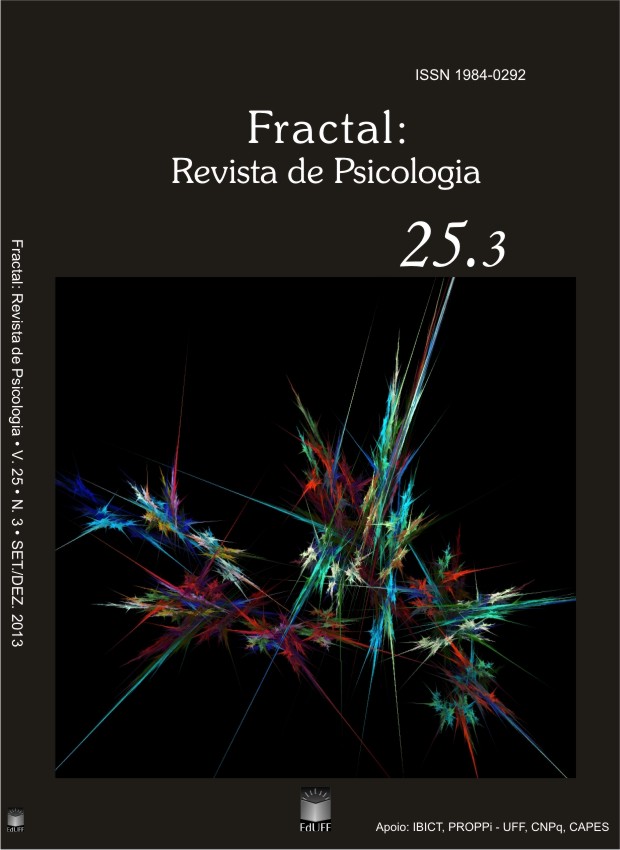Adolescents and crack cocaine: through the rocky path
Keywords:
social psychology, psychoanalysis, cartography, center of infant-juvenile psychosocial attention (CAPSi), drugs (Crack)Abstract
In the last years society has watched a fast expansion of crack cocaine use, especially by adolescents and young adults. The need of listening these subjects in a way of acquiring insights about their situation is made clear. In order to attend this need we developed a descriptive-exploratory qualitative research whose main target was a therapeutic group for adolescents crack users that occurred in the Center of Infant-Juvenile Psychosocial Attention (CAPSi), located in a countryside city of Rio Grande do Sul, Brazil. Supported by an expost-facto modality, we analyzed documents produced in this institution. The result was a cartography that went along with the adolescents’ discourses through the “rocky path”: the places, treatments, persons, ideas and the moments they talk about.Downloads
References
BIRMAN, J. Mal-estar na atualidade: a psicanálise e as novas formas de subjetivação. 6. ed. Rio de Janeiro: Civilização Brasileira, 2007.
CARLINI, E. A. et al. II Levantamento domiciliar sobre o uso de drogas psicotrópicas no Brasil: estudo envolvendo as 108 maiores cidades do país - 2005. São Paulo: CEBRID, UNIFESP, 2006.
DELEUZE, G. Duas questões. In LANCETTI, A. (Org.). SaúdeLoucura. São Paulo: Hucitec, 1991. v. 3, p. 63-66.
DELEUZE, G.; GUATTARI, F. Mil Platôs: capitalismo e esquizofrenia. São Paulo: Editora 34, 1995. v. 1.
DUNKER, C. I. L. Sobre o sujeito: entre a psicanálise e a psicologia social. Psicologia e Sociedade, v. 13, n. 1, p. 64-74, 2001.
ELLIOT, P. The First Rule is… Images and Reflections of the Rhizome in Fight Club. Postgraduate English, n. 12, September 2005 Disponível em: <http://www.dur.ac.uk/postgraduate.english/Elliot.pdf>. Acesso em: 19 jul. 2013.
GONÇALVES, G. G. R.; DELGADO, S. C.; GARCIA, C. A. A toxicomania e a busca da felicidade na sociedade de consumo. In: BAPTISTA, M.; CRUZ, M. S.; MATIAS, R. Drogas e pós-modernidade: prazer, sofrimento e tabu. Rio de Janeiro: EDUERJ, FAPERJ, 2003. v. 1, p.119-128.
GIL, A. C. Como elaborar projetos de pesquisa. São Paulo: Atlas, 1991.
GUATTARI, F.; ROLNIK, S. Micropolítica: cartografias do desejo. 4. ed.. Rio de Janeiro: Vozes, 1996.
NUNES, E. L. G.; ANDRADE, A. G. de. Adolescentes em situação de rua: prostituição, drogas e HIV/AIDS em Santo André, Brasil. Psicol. Soc., v. 21, n. 1, p. 45-54, abr 2009.
OUTEIRAL, J. O. Adolescer: estudos sobre adolescência. 2. ed. Rio de Janeiro: Revinter, 2003.
PASSOS, E. Clínica e subjetividade: descobrindo o sujeito no enfrentamento com a violência e o uso de drogas. In: Conselho Regional de Psicologia. Conversando sobre adolescência e contemporaneidade. Porto Alegre: Libretos, 2004. p. 37-53.
RAUPP, C. M. Adolescência, drogadição e políticas públicas: recortes no contemporâneo. 2006. Dissertação (Mestrado em Psicologia Social e Institucional)__Universidade Federal do Rio Grande do Sul, Porto Alegre, 2006.
REDE BRASIL SUL DE TELECOMUNICAÇÕES Campanha Crack, nem pensar!, 2008. Disponível em: <http://zerohora.clicrbs.com.br/especial/rs/cracknempensar/conteudo,0,3760,A-campanha.html>. Acesso em: 18 nov. 2010.
RIBEIRO, E. M. A toxicomania e os paradoxos da liberdade. Revista da Associação Psicanalítica de Porto Alegre, n. 24, p. 09-17, 2003.
RODRIGUES, H. de B. C.; LEITÃO, M. B. S.; BARROS, R. D. B. de (Org.). Grupos e instituições em análise. 3. ed. Rio de Janeiro: Rosa dos Tempos, 2002.
ROMANINI, M. ROSO, A. Mídia e crack: promovendo saúde ou reforçando relações de dominação? Psicologia: Ciência e Profissão, v. 32, p. 82-97, 2012. Disponível em: <http://www.scielo.br/pdf/pcp/v32n1/v32n1a07.pdf>. Acesso em: 19 jul. 2013.
ROSA, T. Crack: um problema de saúde pública. Consensus: Jornal do Conselho Nacional de Secretários da Saúde, v. 43, n. 4-10, 2010.
ROSO, A. Ideologia, produção de subjetividades e drogas: discursos midiáticos sobre o crack na cultura (pós)-moderna. Santa Maria, RS: Universidade Federal de Santa Maria, 2010.
ROTELLI, F. Onde está o senhor? In: LANCETTI, A. (Org.). SaúdeLoucura. São Paulo: Hucitec, 1991. v. 3, p. 77-90.
SÍCOLI, J. L.; NASCIMENTO, P. R. Health promotion: concepts, principles and practice. Interface - Comunic, Saúde, Educ, v. 7, n. 12, p. 91-112, 2003.
STREY, M. N. Introdução. In STREY, M. N. et al. Psicologia Social Contemporânea. 12. ed. Petrópolis: Vozes, 2009. p. 7-16.
Downloads
Published
How to Cite
Issue
Section
License
Authors publishing in this journal agree to the following terms:
- Authors retain copyright and grant the journal the right of first publication, with the work simultaneously licensed under the Creative Commons Attribution License allowing sharing of the work with acknowledgement of authorship of the work and initial publication in this journal.
- Authors are permitted to enter into additional contracts separately for non-exclusive distribution of the version of the work published in this journal (e.g., publishing in an institutional repository or as a book chapter), with acknowledgment of authorship and initial publication in this journal.

This work is licensed under a Creative Commons Attribution 4.0 International License.
To the extent possible under the law, Fractal: Journal of Psychology has waived all copyright and related rights to the Reference Lists in research articles. This work is published in: Brazil.
To the extent possible under law,Fractal: Journal of Psychology has waived all copyright and related or neighboring rights to Reference lists in research articles. This work is published from: Brazil.







